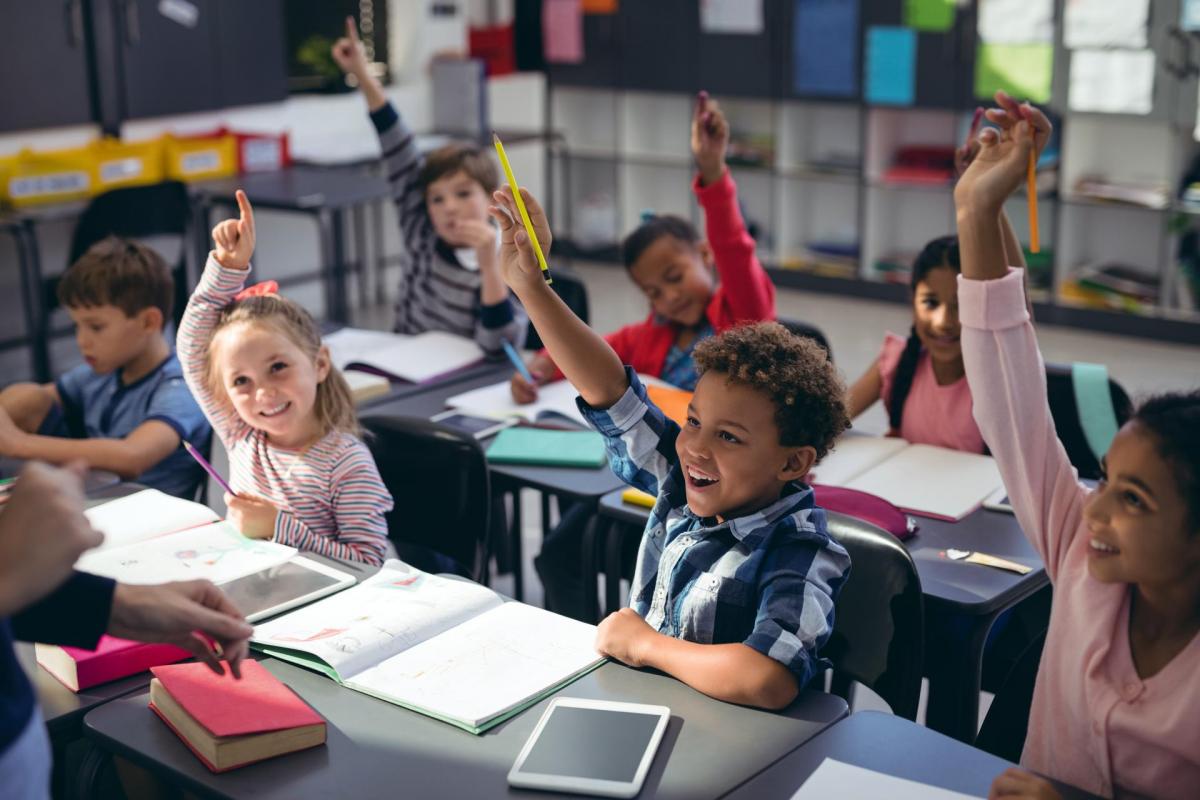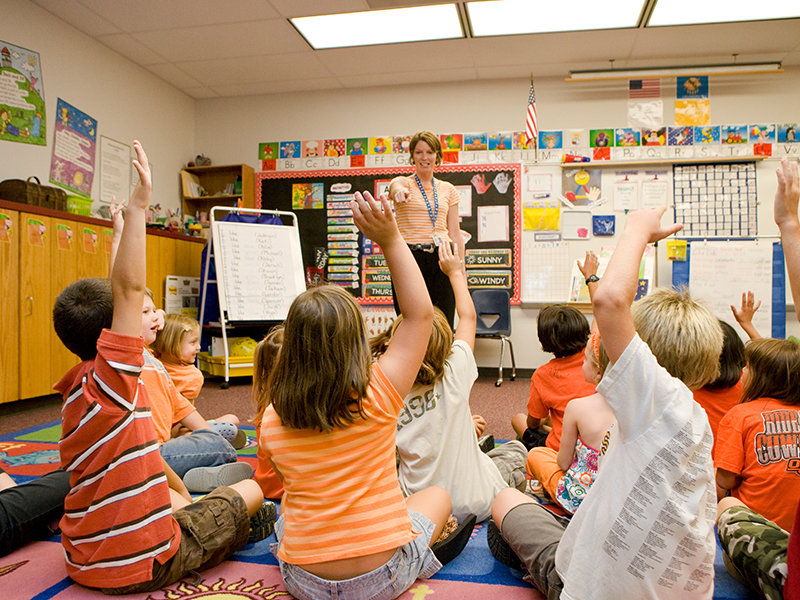Imaginative Learning Activities in Preschool: Enhancing Skills Through Play and Communication
Innovative discovering activities in kindergarten act as fundamental experiences for young students (Private School). These activities motivate skill advancement via playful involvement and social interaction. Youngsters explore their imagination, improve interaction, and learn beneficial social abilities. Each experience adds to their growth in unique means. Comprehending exactly how these tasks form very early advancement discloses the extensive impact of play in education and learning. What certain aspects make these experiences so effective in nurturing all-round people?
The Role of Play in Early Childhood Advancement
While lots of may ignore the importance of play, it functions as a basic part of very early childhood years development. With play, youngsters explore their environments, foster social abilities, and create cognitive capacities. Involving in disorganized tasks allows them to use their creativity, explore problem-solving, and improve their essential thinking skills. Moreover, play supplies a risk-free room for emotional expression, enabling children to navigate their sensations and build resilience.
Additionally, play motivates physical growth as kids take part in activities that boost their motor abilities and control. Interaction with peers during play advertises synergy and communication, preparing for future partnerships. Private School. Educators and parents recognize that play is not just a leisure activity however an important aspect of understanding, shaping a kid's capacity to thrive and adapt in various circumstances. Inevitably, play enhances youngsters's lives, preparing them for the challenges of the future while fostering a long-lasting love for knowing
Innovative Arts and Crafts: Stimulating Imagination
Innovative arts and crafts play a substantial function in sparking youngsters's creativities and boosting their creative abilities. These activities motivate self-expression through various tools, such as paint, drawing, and sculpting. By taking part in hands-on tasks, youngsters find out to control products, cultivating great electric motor skills and hand-eye coordination.
Additionally, creative arts provide a platform for vital and problem-solving thinking, as children discover various strategies and techniques to their productions. This expedition permits them to experiment, make decisions, and pick up from their experiences.
Partnership is one more essential facet, as children often collaborate on team tasks, sharing concepts and resources. This interaction not just builds social abilities however also supports a sense of community. Inevitably, innovative arts and crafts function as important tools in a kindergarten setup, advertising cognitive, emotional, and social development while sparking the innate curiosity and creative imagination of young learners.
Interactive Narration: Structure Language Skills
Interactive narration acts as a powerful device for building language abilities in young children, as it involves them in the narrative process and urges energetic participation. With storytelling sessions, youngsters are invited to pay attention, react, and even contribute to the unraveling tale. This interactive format supports vocabulary development by exposing them to new words in context.
As they participate, kids exercise necessary interaction skills, such as articulation and expression. They discover to series events, determine personalities, and understand the plot, cultivating critical reasoning. Furthermore, interactive storytelling resource usually integrates aesthetic aids, audio effects, and props, which even more enhance involvement and understanding.
When kids share their own stories, they experience a feeling of agency and creativity, reinforcing their language skills in a helpful environment. Inevitably, interactive storytelling grows a love for language and literary works, setting a solid foundation for their future scholastic success.
Hands-On Science Experiments: Encouraging Questions
Hands-on science experiments offer young learners with very useful opportunities to discover and make inquiries regarding the globe around them. Taking part in straightforward, interactive experiments allows kindergarteners to ask concerns, make forecasts, and observe outcomes firsthand. These activities promote interest and promote a sense of wonder, encouraging children to investigate the residential or commercial properties of products, reactions, and natural sensations.
As an example, experiments such as planting seeds or blending sodium bicarbonate and vinegar not just illustrate clinical concepts but additionally enhance essential thinking skills. Children learn to document their monitorings, promoting proficiency and numeracy as they determine, compare, and record information. In addition, hands-on scientific research cultivates a development state of mind, training strength as they browse challenges and find out from blunders.

Collaborative Gamings: Fostering Teamwork and Social Abilities
Engaging in collective games uses kindergarteners an unique system to establish team effort and social abilities while improving the inquiry-based knowing fostered by hands-on science experiments (Grade School). These games motivate youngsters to interact towards typical goals, promoting communication and teamwork. As they navigate different obstacles, they find out to share obligations, work out functions, and fix problems-- vital elements of reliable team effort
With organized activities such as team problems, site web relay races, or participating narration, children not just improve their social communications yet additionally reinforce their psychological intelligence. They get understandings into compassion and assistance, finding out that each child's payment is important. Furthermore, these joint experiences cultivate a sense of community within the classroom, creating bonds that extend beyond specific play. By incorporating collaborative games into the educational program, instructors can lay the groundwork for necessary life abilities that will certainly benefit youngsters in their future instructional and social atmospheres.
Regularly Asked Concerns
How Can Moms And Dads Assistance Creative Understanding at Home?
Parents can sustain imaginative knowing at home by providing varied materials, motivating expedition, taking part in imaginative play, asking flexible questions, and cultivating click to investigate a risk-free environment where kids feel complimentary to express their ideas and imagination.

What Products Are Finest for Arts and Crafts Activities?
A range of materials enhance arts and crafts activities, consisting of building and construction paper, scissors, glue, markers, paints, and recycled items. These resources influence imagination and permit kids to explore their imagination via hands-on experiences.
Just How Do Educators Evaluate Children's Creative thinking?
Teachers evaluate youngsters's imagination with observations, profiles of job, and flexible tasks that motivate self-expression. They assess analytical abilities, creativity, and readiness to experiment, offering understandings into each kid's unique imaginative development and capacities.
What Are Some Examples of Outdoor Creative Activities?

Exactly How Can Social Motifs Be Integrated Into Creative Discovering?
Cultural motifs can be integrated into imaginative learning by integrating diverse tales, music, art, and traditions, encouraging kids to discover and commemorate various histories, promoting inclusivity and understanding while boosting their imagination and cognitive skills.
Children explore their creative thinking, improve communication, and learn useful social abilities. Through play, children discover their environments, foster social skills, and develop cognitive capabilities. Furthermore, play urges physical growth as youngsters engage in activities that boost their electric motor skills and control. Creative arts and crafts play a considerable duty in stiring up children's creative imaginations and improving their creative abilities. Interactive narration serves as a powerful tool for constructing language skills in young children, as it involves them in the narrative process and motivates active participation.